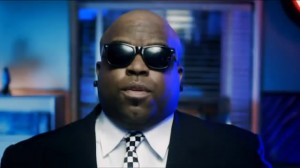Motown continues to exert its influence on popular music, as today’s acts use those lovely swooping vocal harmonies and up-and-down melodies over contemporary beats. The best modern songs – Outkast’s Hey Ya, Amy Winehouse’s Rehab, Sean Kingston’s Beautiful Girls and, above all, Gnarls Barkley’s Crazy – are as catchy as anything from the 1960s heyday. Now Gnarls Barkley’s portly vocalist, Cee Lo Green (above), has added another to the canon. His latest single is notable for two things: a great tune; and the blunt title F*** You.
It is such a good song that it’s bound to be a ubiquitous ringtone smash, and watching Green perform it on Jools Holland last week I wondered whether we might one day look back and point to it as the moment when the F-Bomb indisputably became an F-Squib; in other words, when saying the F-word lost whatever scant power it still possesses to shock and entered the acceptable mainstream, just as most phallic and scatological profanities have before it.
Perhaps we should reflect on just how quickly it has come to this…. Consider the flapping that followed the Sex Pistols’ infamous interview with Bill Grundy. How tame it seems now: if anything, they come across as slightly naughty but basically decent schoolboys sticking up for a girl against a sleazy old buffoon.
Now watch an episode of E4’s sitcom about sixth-formers The Inbetweeners. The unstoppable flow of obscenities and sexual references would make a salty old sailor blush. And these are middle-class kids. Once the divide between swearers and non-swearers was broadly class-based (the toffs and the workers did, the middle-classes didn’t); now it is purely generational. In The Inbetweeners the F-bomb is in every other line, the C-word at least once or twice per episode. The C-word! It wasn’t so long ago at all that this most crude of the gynaecological Anglo-Saxon expletives could only be broadcasted between 1am and 2am on Channel 4 by licensed practitioners – and the only person with a license was Jerry Sadowitz. Now it’s everywhere, and the consequences for comedy are disastrous because, essentially, there is nowhere to go.
In the 1996 film Trainspotting, Robert Carlyle’s character Begbie utters the immortal bit of nonsense: “It was f***n’ obvious that that c***was gonnae f*** some c***.” His listeners nod wisely, and the scene is funny because it satirises the mundane emptiness that results from substituting profanities for, well, every noun and verb. It was also unusual to see it on film. Now most sketch-shows contain such levels of swearing and as comedic tools cuss-words have been rendered useless. After The Wire took the joke to its ultimate limit, what’s left?
There are still bombs, of course, but they are different ones. The N-word, the P-word and various homophobic slanders have become the new taboos. A few comedians such as Sarah Silverman are brave enough to play with these particular fires, deploying irony as a heat shield, but these words are of a different order to the old taboos in that they are specifically hate-words. Not funny. Objectively, it suggests some sort of progress that we should take more offence at racist references than we do at synonyms for rumpy-pumpy. But the F-Bomb was a usefully indiscriminate weapon, and its proliferation is to be regretted. It no longer shocks but its ubiquity, especially on the internet, still has an effect, and an egregious one: by becoming a shortcut to emphasis it has rendered 90% of discourse dull, depressing and vaguely nauseating. So to conclude: Mary Whitehouse was right all along: it was a slippery slope. Now when she told you to f*** off you f***ing well knew about it, and you f***ing well did it, too.












You say it no longer shocks but I see you’re not taking any chances. I think it’ll be game over when you hear it in a TV advert. (Maybe we already have, I’ve not been paying much attention).
I lay the blame firmly at the feet of that Appleyard wallah, ’twas him introduced us to The Wire.
Ian – I have a Profanity Policy on blogs which works out similar to that of The Times newspaper, for the reasons alluded to in the post, and set out more clearly here.
And yes, an ad would be a good benchmark, though I note that F*** You went straight in at number 1, beating the Robbie Williams /Gary Barlow bromance duet…
It all seems to have started with cricket
It’s about fuffing time if you ask this clunt.
Having spent a lot of time in Edinburgh, I’m sorry to say that the Begbie line isn’t really a satire on mundane emptiness. It’s just the way a lot of people talk there.